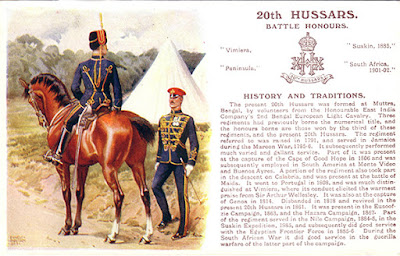The following fifty men, all serving with the 11th Hussars, became Prisoners of War of the Germans before 25th December 1914.
A number of the men appear on more than one list, catalogued today at The Imperial War Museum under B.O.2 1/157 and B.O.2 1/158. The full entries, not transcribed here, also include the men's home addresses.
6039, later 46125 Private A Allcock
5767, later 46096 Sergeant J W Allison
6232 Private H Applegarth
6040, later 46126 Private C Austin
7527 Private D Austin
29742 Private Walter Ayres
6565 Private Frank G Bangay
6174 Private B Clarke
9198 Private F Cockram
1356 Corporal E Garner
6723 Private Phillip Garthwaite
5704, later 46088 Private Samuel S Gash
6601 Private C Goodwin
5731 Private H Groom
7564 Private C Hall
5835 Lance-Corporal B Hart
10016 Private T Hasprey
9445 Private John Helme
9597 Corporal Arthur Hinchliffe
8251 Private P S Huggett
8245 Lance-Corporal B Jackson
6992 Private M Knowles
5674 Private F Lake
5585, later 46072 Private (Bandsman) T Lazenby
5077, later 46032 Private Frank Ledger
2921 Private T Lennon
9376 Private L Mansell
837 Lance-Corporal C Massey
8541 Private R W Morgan
5738, later 46145 Corporal Thomas F Noble
8242 Lance-Corporal F Penrice
8135 Lance-Corporal H Peplow
5814, later 46100 Private A L Reeson
1391 Private J Robins
6391 Corporal R W Robinson
9195 Private A T Saunders
5775, later 46097 Private A Sessions
9373 Private G Shaw
10865 Private A E Sketes
9571 Private T Spiers
5555, later 46065 Private J Stott
5318 Private J Surridge
9208 Private W Talbot
3937 Sergeant F C Taylor
6015, later 46121 Private Harry Towner
9576 Private J Ward
5558, later 46055 Private James Welsh
9577 Private B J White
5561 Private E Woodley
3784 Private C Wright
5767, later 46096 Sergeant J W Allison
6232 Private H Applegarth
6040, later 46126 Private C Austin
7527 Private D Austin
29742 Private Walter Ayres
6565 Private Frank G Bangay
6174 Private B Clarke
9198 Private F Cockram
1356 Corporal E Garner
6723 Private Phillip Garthwaite
5704, later 46088 Private Samuel S Gash
6601 Private C Goodwin
5731 Private H Groom
7564 Private C Hall
5835 Lance-Corporal B Hart
10016 Private T Hasprey
9445 Private John Helme
9597 Corporal Arthur Hinchliffe
8251 Private P S Huggett
8245 Lance-Corporal B Jackson
6992 Private M Knowles
5674 Private F Lake
5585, later 46072 Private (Bandsman) T Lazenby
5077, later 46032 Private Frank Ledger
2921 Private T Lennon
9376 Private L Mansell
837 Lance-Corporal C Massey
8541 Private R W Morgan
5738, later 46145 Corporal Thomas F Noble
8242 Lance-Corporal F Penrice
8135 Lance-Corporal H Peplow
5814, later 46100 Private A L Reeson
1391 Private J Robins
6391 Corporal R W Robinson
9195 Private A T Saunders
5775, later 46097 Private A Sessions
9373 Private G Shaw
10865 Private A E Sketes
9571 Private T Spiers
5555, later 46065 Private J Stott
5318 Private J Surridge
9208 Private W Talbot
3937 Sergeant F C Taylor
6015, later 46121 Private Harry Towner
9576 Private J Ward
5558, later 46055 Private James Welsh
9577 Private B J White
5561 Private E Woodley
3784 Private C Wright
I research soldiers!
Contact me if you need help with your military ancestor.























